Oceans North Welcomes Canada’s Support for Deep Sea Mining Moratorium in International Waters
KINGSTON, JAMAICA—As meetings of the International Seabed Authority (ISA) begin today, the list of countries calling for a pause, moratorium, or ban on deep-sea mining now includes Canada.
“Canada has made many commitments to protect nature and has been a champion of ocean conservation both at home and around the world,” says Susanna Fuller, Vice President of Conservation and Projects at Oceans North. “We’re happy to see our country now step up to further protect the deep sea, which will have a significant impact on how the negotiations at the ISA unfold this week.”
Deep-sea mining is an emerging industry that could cause irrevocable damage to some of the planet’s last intact ecosystems. These are places that science knows very little about—recently, researchers announced they had catalogued over 5000 new species in the Clarion-Clipperton Zone, a region of the seabed that could soon be open to mining. Over 700 scientists have signed a letter calling on states to halt deep-sea mining due to the massive amount we do not know and the harm to the entire marine system that could come from mining the deep seabed.
The ISA is the international body that is meant to regulate the use of the deep seabed and its resources. However, there is no regulatory framework in place right now for commercial deep-sea mining. Two years ago, the Republic of Nauru triggered the ISA’s “two-year rule,” which required countries to either come up with a mining code in the allotted time frame or allow mining to go ahead. Countries have spent the last two years negotiating but failed to meet the deadline. The meeting at the ISA headquarters this month will decide whether deep-sea mining can and should go ahead in the absence of regulations.
Earlier this year, Canada announced an effective moratorium on deep-sea mining in domestic waters. Canada is not a sponsoring country for deep-sea mining contracts, nor does Canada have any exploration contract areas in international waters.
“The pressure is on to protect the deep sea, and Canada’s support for a moratorium comes at a critical moment,” says Nicole Zanesco, Oceans North’s International Policy Advisor, who is attending the meeting in person this month. “We are looking forward to Canada’s continued engagement at the ISA on key issues such as environmental research and protection, good governance and transparency, and capacity building.”
For more information, please contact:
Alex Tesar
Communications Manager
[email protected]




